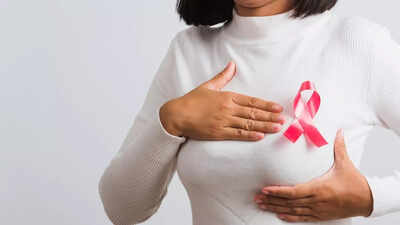ARTICLE AD BOX

Breast cancer is one of the most common cancers affecting women worldwide, but many often ask, Is breast cancer hereditary? While most cases occur randomly, a small percentage are linked to inherited genes, such as BRCA1 and BRCA2, which can increase the risk of breast and ovarian cancer.
Having a close relative, like a mother, sister, or daughter, with breast cancer may raise your risk, especially if they were diagnosed at a young age. Understanding your family history of breast cancer and assessing your personal risk is crucial for early detection and prevention. Genetic testing can identify inherited mutations, allowing timely screening and lifestyle adjustments to protect your breast health and overall well-being.
Understanding what breast cancer is and the impact of
family history and geneticsBreast cancer develops when certain cells in the breast begin to grow uncontrollably. These abnormal cells divide faster than normal, accumulating to form a lump or mass. In some cases, they can spread (metastasise) to nearby lymph nodes or other parts of the body. Most breast cancers start in the milk-producing ducts, known as invasive ductal carcinoma, or in the lobules, the glands that produce milk, called invasive lobular carcinoma, though they can also originate in other breast tissues.
Having a close family member, like your mother, sister, or daughter, with breast cancer can increase your risk. The chances are higher if:
- The relative was diagnosed before age 50
- More than one family member has had breast or ovarian cancer
- A male relative has had breast cancer
According to a study published in Scientific Reports, family history is a significant risk factor for breast cancer, with approximately 5-10% of cases linked to familial ties. The research analysed data from over 10,000 breast cancer patients and found that those with a family history of breast or ovarian cancer were diagnosed at a younger age and often presented with more advanced disease stages.
Notably, patients with first-degree relatives affected by these cancers had a higher median age at diagnosis and more aggressive tumour characteristics.
What does “genetic” mean in breast cancer
In some families, breast cancer risk is linked to changes in certain genes that can be passed from parents to children. These changes are called gene mutations.According to Cancer Research UK, the most common are BRCA1 and BRCA2, which normally help protect against cancer. When they don’t work properly, the risk of breast and ovarian cancer increases.Other, less common genes such as PALB2, CHEK2, and TP53 can also raise risk, but having these mutations doesn’t mean you will definitely get cancer. It only means your chances are higher than average.
How to know if you carry a genetic mutation for breast cancer
Genetic testing can help identify whether you carry an inherited mutation that increases your risk of breast cancer. A doctor or genetic counsellor can guide you on which test is suitable based on your personal and family history of breast or related cancers.You might consider genetic testing if:
- You or a close family member were diagnosed with breast cancer before age 50 or had two separate primary breast cancers.
- You or a family member was diagnosed with triple-negative breast cancer at any age.
- You or a family member had ovarian, pancreatic, or high-risk prostate cancer.
- You are a man diagnosed with breast cancer, or have a male relative who was.
- You have Ashkenazi Jewish (Eastern European) ancestry.
- Multiple blood relatives on either side of the family have had breast cancer.
- There is a known breast cancer gene mutation in your family.
Having one relative with a genetic mutation does not necessarily mean all family members will inherit it.
When to consider genetic testing
Genetic testing can help identify whether you carry a gene that increases cancer risk. It’s usually recommended if:
- You have several relatives with breast or ovarian cancer
- You were diagnosed at a young age
- There’s a known gene mutation in your family
A genetic counsellor will explain what the results mean and what steps you can take to protect your health.
How to reduce your risk of developing breast cancer
Even if you have a higher risk, there are many ways to lower it:
- Go for regular screenings (like mammograms or MRIs if advised)
- Stay active and maintain a healthy weight
- Eat a balanced diet with plenty of fruits, vegetables, and whole grains
- Limit alcohol and avoid smoking
- Discuss preventive options with your doctor if needed
Disclaimer: This article is for informational purposes only and should not be considered medical advice. Please consult a healthcare professional before making any changes to your diet, medication, or lifestyle.Also read | Brain tumour early warning signs that you should not ignore

 8 hours ago
3
8 hours ago
3









 English (US) ·
English (US) ·